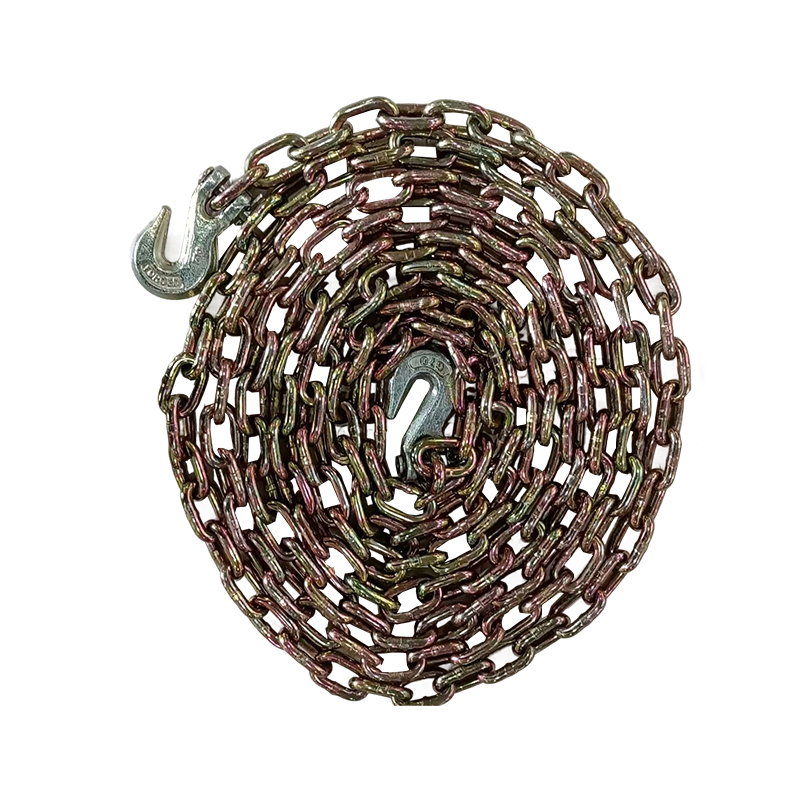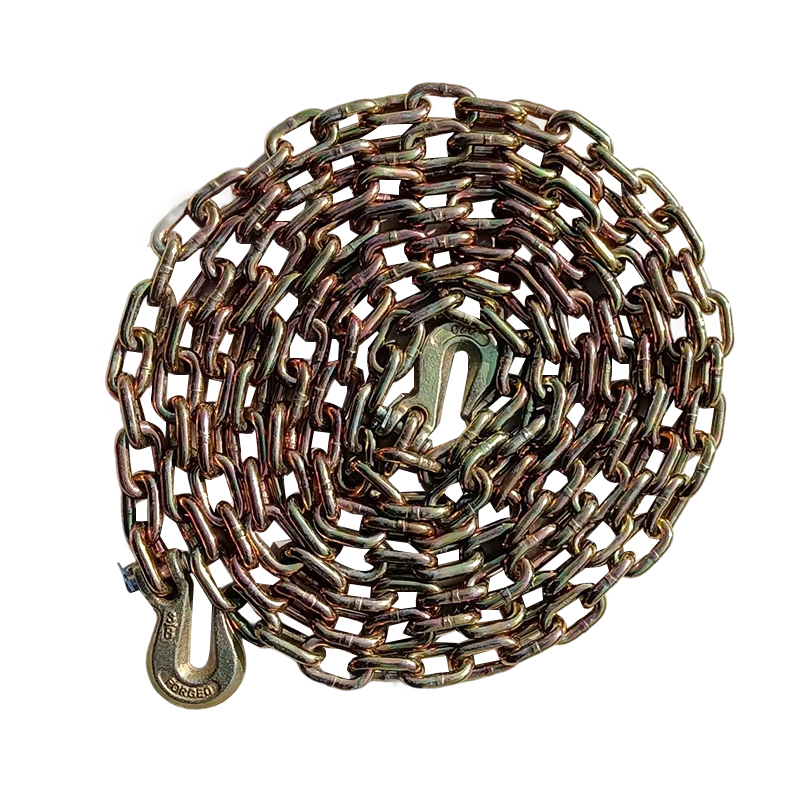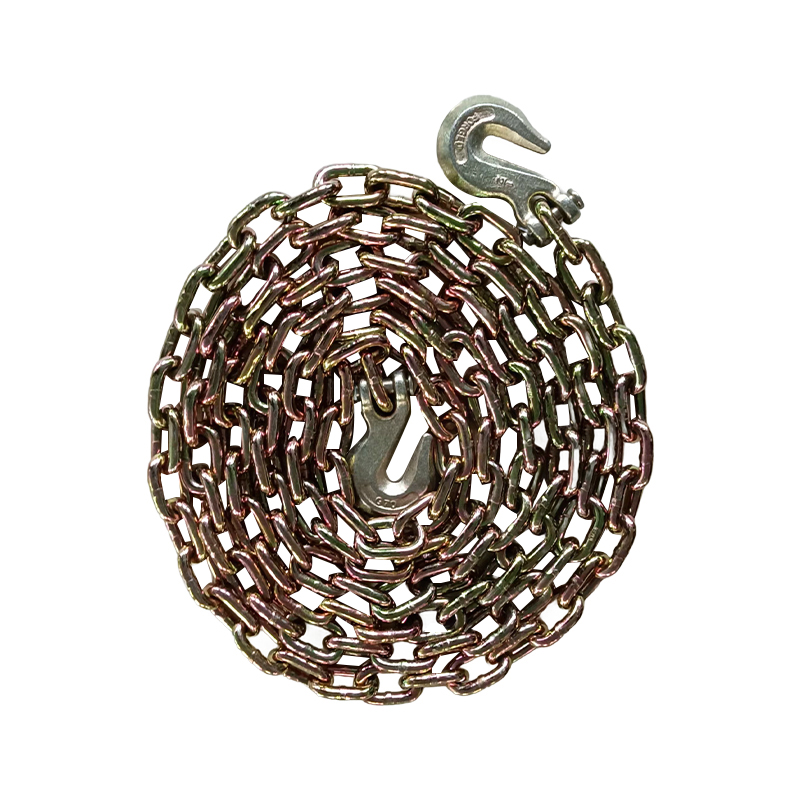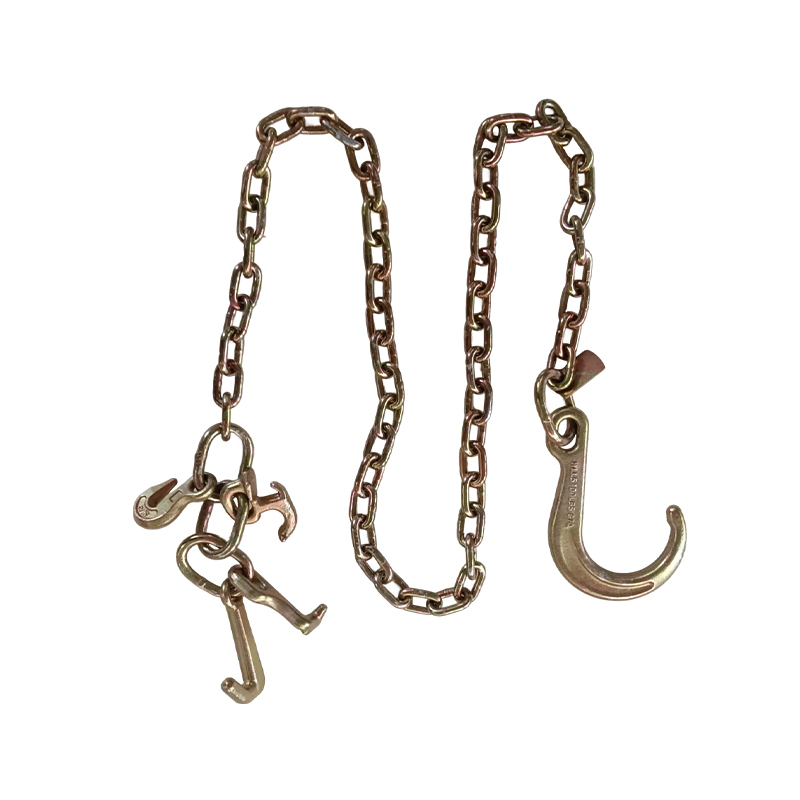How to improve the wear resistance and load-bearing capacity of trailer chain through high-strength alloy steel?
Release Time : 2025-07-16
In the manufacturing process of trailer chain, the choice of materials directly determines the performance of the product. As an engineering material with excellent performance, high-strength alloy steel is widely used in various high-strength and high-load mechanical structural parts. In the manufacture of trailer chain, the use of high-strength alloy steel not only significantly improves the wear resistance and load-bearing capacity of the chain, but also enhances its reliability and service life in complex environments, providing a solid guarantee for trailer towing operations.
First of all, the material properties of high-strength alloy steel provide trailer chain with excellent tensile strength and toughness. During the towing process, the chain needs to withstand the huge traction between the vehicle and the trailer, especially when starting, stopping suddenly or driving on bumpy roads, the instantaneous tension is particularly significant. Ordinary carbon steel chains are prone to fatigue deformation or even fracture after being subjected to high-strength tension for a long time. However, due to its special chemical composition and microstructure, high-strength alloy steel can effectively resist external forces and maintain structural stability, thereby greatly reducing the risk of fracture and ensuring the safety of trailer operations.
Secondly, high-strength alloy steel has excellent wear resistance, which is crucial for the durability of trailer chains in long-term use. During the use of the chain, friction and sliding occur continuously between the links, especially when frequently hooked, unhooked or used in muddy, dusty environments, the wear problem is particularly prominent. High-strength alloy steel not only has high surface hardness, but also has further improved wear resistance after heat treatment or surface strengthening process. This material advantage enables the chain to maintain good pitch accuracy and structural integrity after long-term use, reducing loosening, jamming and even breakage caused by wear, thereby extending the service life of the chain.
Furthermore, the processing technology of high-strength alloy steel also plays an important role in improving the performance of trailer chains. Modern manufacturing processes use precision forging, heat treatment and surface treatment to make alloy steel chains have more uniform internal structure and more stable mechanical properties. For example, the chain that has been quenched and tempered not only maintains high strength, but also enhances toughness, making it less prone to brittle fracture when subjected to impact loads. In addition, some high-end chains will also use surface treatment technologies such as electroplating and shot peening to further improve their corrosion resistance and fatigue life, so that they can still perform well in harsh environments.
In addition, the structural design of high-strength alloy steel also provides a basis for the performance optimization of trailer chains. In the manufacturing process of modern trailer chains, not only the performance of the material itself is relied on, but also the geometry and connection method of the chain links are optimized to improve the stability of the overall structure and the uniformity of force distribution. The machinability of high-strength alloy steel allows manufacturers to adopt more complex and precise structural designs, so that the chain can disperse stress to a larger contact surface when subjected to high loads, avoiding early failure caused by local stress concentration. This combination of design and material enables the trailer chain to maintain stable operation under extreme conditions.
It is worth mentioning that high-strength alloy steel not only improves the performance of trailer chains, but also enhances their adaptability under different environmental conditions. Whether in cold areas or high temperature environments, alloy steel chains can maintain good mechanical properties. In corrosive environments such as moisture and salt spray, high-strength alloy steel combined with anti-rust coating can effectively resist oxidation and corrosion, preventing the chain from failing prematurely due to environmental factors. This wide range of environmental adaptability makes high-strength alloy steel chains not only suitable for daily transportation, but also for outdoor adventures, engineering operations and other scenes that require higher strength and durability.
Finally, the application of high-strength alloy steel also improves the overall use experience of the trailer chain. During the use of the chain, if the material strength is insufficient or the wear resistance is poor, it is easy to loosen, make abnormal noises or even break, affecting the stability and safety of the operation. The chain made of high-strength alloy steel not only runs more smoothly, but also effectively reduces the noise and vibration caused by wear or deformation, making the trailer process smoother and safer. At the same time, due to its stronger durability, the maintenance frequency is also reduced accordingly, and users do not need to frequently replace or overhaul the chain, saving the use cost and time.
In summary, by adopting high-strength alloy steel, the trailer chain has achieved significant improvements in wear resistance and load-bearing capacity. This material not only gives the chain stronger tensile strength and impact resistance, but also enhances its stability and durability in complex environments. At the same time, combined with advanced manufacturing technology and structural optimization design, high-strength alloy steel chains provide users with a safer, more reliable and more efficient trailer experience. With the continuous advancement of material technology, the application of high-strength alloy steel in the field of trailer chains will continue to promote the development of this product towards higher performance and longer life.
First of all, the material properties of high-strength alloy steel provide trailer chain with excellent tensile strength and toughness. During the towing process, the chain needs to withstand the huge traction between the vehicle and the trailer, especially when starting, stopping suddenly or driving on bumpy roads, the instantaneous tension is particularly significant. Ordinary carbon steel chains are prone to fatigue deformation or even fracture after being subjected to high-strength tension for a long time. However, due to its special chemical composition and microstructure, high-strength alloy steel can effectively resist external forces and maintain structural stability, thereby greatly reducing the risk of fracture and ensuring the safety of trailer operations.
Secondly, high-strength alloy steel has excellent wear resistance, which is crucial for the durability of trailer chains in long-term use. During the use of the chain, friction and sliding occur continuously between the links, especially when frequently hooked, unhooked or used in muddy, dusty environments, the wear problem is particularly prominent. High-strength alloy steel not only has high surface hardness, but also has further improved wear resistance after heat treatment or surface strengthening process. This material advantage enables the chain to maintain good pitch accuracy and structural integrity after long-term use, reducing loosening, jamming and even breakage caused by wear, thereby extending the service life of the chain.
Furthermore, the processing technology of high-strength alloy steel also plays an important role in improving the performance of trailer chains. Modern manufacturing processes use precision forging, heat treatment and surface treatment to make alloy steel chains have more uniform internal structure and more stable mechanical properties. For example, the chain that has been quenched and tempered not only maintains high strength, but also enhances toughness, making it less prone to brittle fracture when subjected to impact loads. In addition, some high-end chains will also use surface treatment technologies such as electroplating and shot peening to further improve their corrosion resistance and fatigue life, so that they can still perform well in harsh environments.
In addition, the structural design of high-strength alloy steel also provides a basis for the performance optimization of trailer chains. In the manufacturing process of modern trailer chains, not only the performance of the material itself is relied on, but also the geometry and connection method of the chain links are optimized to improve the stability of the overall structure and the uniformity of force distribution. The machinability of high-strength alloy steel allows manufacturers to adopt more complex and precise structural designs, so that the chain can disperse stress to a larger contact surface when subjected to high loads, avoiding early failure caused by local stress concentration. This combination of design and material enables the trailer chain to maintain stable operation under extreme conditions.
It is worth mentioning that high-strength alloy steel not only improves the performance of trailer chains, but also enhances their adaptability under different environmental conditions. Whether in cold areas or high temperature environments, alloy steel chains can maintain good mechanical properties. In corrosive environments such as moisture and salt spray, high-strength alloy steel combined with anti-rust coating can effectively resist oxidation and corrosion, preventing the chain from failing prematurely due to environmental factors. This wide range of environmental adaptability makes high-strength alloy steel chains not only suitable for daily transportation, but also for outdoor adventures, engineering operations and other scenes that require higher strength and durability.
Finally, the application of high-strength alloy steel also improves the overall use experience of the trailer chain. During the use of the chain, if the material strength is insufficient or the wear resistance is poor, it is easy to loosen, make abnormal noises or even break, affecting the stability and safety of the operation. The chain made of high-strength alloy steel not only runs more smoothly, but also effectively reduces the noise and vibration caused by wear or deformation, making the trailer process smoother and safer. At the same time, due to its stronger durability, the maintenance frequency is also reduced accordingly, and users do not need to frequently replace or overhaul the chain, saving the use cost and time.
In summary, by adopting high-strength alloy steel, the trailer chain has achieved significant improvements in wear resistance and load-bearing capacity. This material not only gives the chain stronger tensile strength and impact resistance, but also enhances its stability and durability in complex environments. At the same time, combined with advanced manufacturing technology and structural optimization design, high-strength alloy steel chains provide users with a safer, more reliable and more efficient trailer experience. With the continuous advancement of material technology, the application of high-strength alloy steel in the field of trailer chains will continue to promote the development of this product towards higher performance and longer life.







